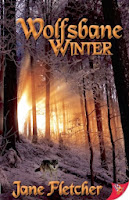My Real Children by Jo Walton
Tor, 2014

Overview: We meet Patricia Cowan in 2015 in a nursing home, and learn that not only is she suffering from dementia, but she is confused about which life she actually led. Nearly the entire book chronicles two very different life stories that exist in very different worlds which both resemble our own.
This is really more of a work of literary fiction than science fiction, despite being published by Tor, so if you're hoping for something solidly science fiction you might be disappointed. (IT'S SO GOOD THOUGH.)
My reaction: I was surprised and delighted that Patricia (called Pat in her happier life story, Trisha/Trish in the other) falls in love with a woman in one of her two worlds, but didn't get my hopes up due to a typically cagey description on the inside cover. As a result, I guessed that it would last at most a chapter, but should have known better: a major reason I started this blog with the Lesbrarian is publishers' systematic erasure of queer content on covers and in metadata to market to a larger audience. This is the first such book we've found without research, though, which inspired me to get back to this blog!
A fair warning: this book really wrung me out emotionally. The counterpart to the beautiful lesbian relationship that bloomed just after World War II was the heartbreaking story of an abusive marriage to an insufferable man, and the roller coaster of emotions Walton evoked in me as she switched between the two is a seriously good (but not painless) ride.
Walton balances the two stories exquisitely. Pat's, while generally the happier of the two stories, had the tears running down my cheeks by the end (even though I knew, thanks to the first chapter, exactly where Pat would end up) while Trish's life gradually gets brighter until she again has more than her share of pain.
Neither Pat or Trish is perfect, nor should they be, but I was particularly annoyed at Pat's skepticism about her Muslim son-in-law and the name for one of his children. While I understood where Trish was coming from with her naive but sometimes hurtful attitudes towards gay sex (not people! amazing!), Pat's mild xenophobia in her later years just baffled and upset me.
Other than that, My Real Children was amazing. I can't say too much more without giving things away, but it was a really thought-provoking read in its entirety, and--as you might guess--Pat's love story will stick with me for a long time.
Just make sure you have some Kleenex. (Really. Books don't usually make me cry.)









